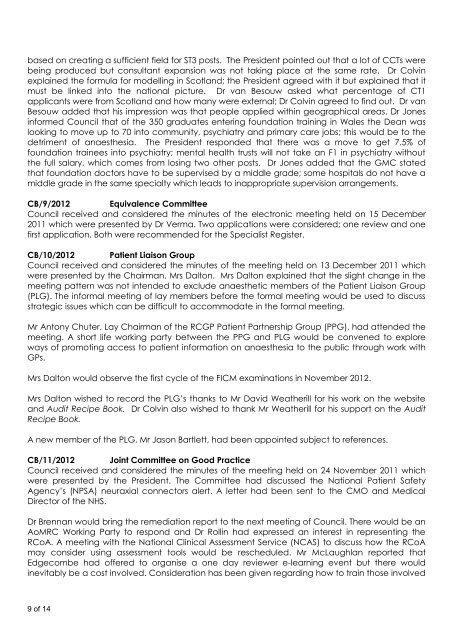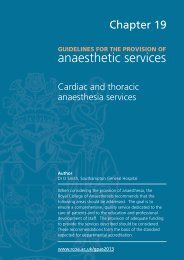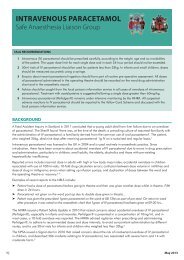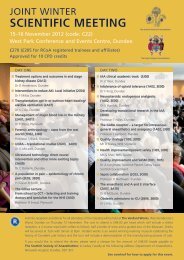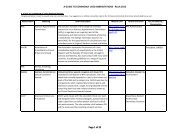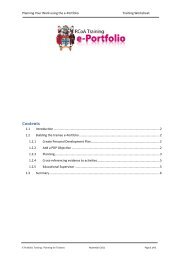January - The Royal College of Anaesthetists
January - The Royal College of Anaesthetists
January - The Royal College of Anaesthetists
You also want an ePaper? Increase the reach of your titles
YUMPU automatically turns print PDFs into web optimized ePapers that Google loves.
ased on creating a sufficient field for ST3 posts. <strong>The</strong> President pointed out that a lot <strong>of</strong> CCTs were<br />
being produced but consultant expansion was not taking place at the same rate. Dr Colvin<br />
explained the formula for modelling in Scotland; the President agreed with it but explained that it<br />
must be linked into the national picture. Dr van Besouw asked what percentage <strong>of</strong> CT1<br />
applicants were from Scotland and how many were external; Dr Colvin agreed to find out. Dr van<br />
Besouw added that his impression was that people applied within geographical areas. Dr Jones<br />
informed Council that <strong>of</strong> the 350 graduates entering foundation training in Wales the Dean was<br />
looking to move up to 70 into community, psychiatry and primary care jobs; this would be to the<br />
detriment <strong>of</strong> anaesthesia. <strong>The</strong> President responded that there was a move to get 7.5% <strong>of</strong><br />
foundation trainees into psychiatry; mental health trusts will not take an F1 in psychiatry without<br />
the full salary, which comes from losing two other posts. Dr Jones added that the GMC stated<br />
that foundation doctors have to be supervised by a middle grade; some hospitals do not have a<br />
middle grade in the same specialty which leads to inappropriate supervision arrangements.<br />
CB/9/2012 Equivalence Committee<br />
Council received and considered the minutes <strong>of</strong> the electronic meeting held on 15 December<br />
2011 which were presented by Dr Verma. Two applications were considered; one review and one<br />
first application. Both were recommended for the Specialist Register.<br />
CB/10/2012 Patient Liaison Group<br />
Council received and considered the minutes <strong>of</strong> the meeting held on 13 December 2011 which<br />
were presented by the Chairman, Mrs Dalton. Mrs Dalton explained that the slight change in the<br />
meeting pattern was not intended to exclude anaesthetic members <strong>of</strong> the Patient Liaison Group<br />
(PLG). <strong>The</strong> informal meeting <strong>of</strong> lay members before the formal meeting would be used to discuss<br />
strategic issues which can be difficult to accommodate in the formal meeting.<br />
Mr Antony Chuter, Lay Chairman <strong>of</strong> the RCGP Patient Partnership Group (PPG), had attended the<br />
meeting. A short life working party between the PPG and PLG would be convened to explore<br />
ways <strong>of</strong> promoting access to patient information on anaesthesia to the public through work with<br />
GPs.<br />
Mrs Dalton would observe the first cycle <strong>of</strong> the FICM examinations in November 2012.<br />
Mrs Dalton wished to record the PLG’s thanks to Mr David Weatherill for his work on the website<br />
and Audit Recipe Book. Dr Colvin also wished to thank Mr Weatherill for his support on the Audit<br />
Recipe Book.<br />
A new member <strong>of</strong> the PLG, Mr Jason Bartlett, had been appointed subject to references.<br />
CB/11/2012 Joint Committee on Good Practice<br />
Council received and considered the minutes <strong>of</strong> the meeting held on 24 November 2011 which<br />
were presented by the President. <strong>The</strong> Committee had discussed the National Patient Safety<br />
Agency’s (NPSA) neuraxial connectors alert. A letter had been sent to the CMO and Medical<br />
Director <strong>of</strong> the NHS.<br />
Dr Brennan would bring the remediation report to the next meeting <strong>of</strong> Council. <strong>The</strong>re would be an<br />
AoMRC Working Party to respond and Dr Rollin had expressed an interest in representing the<br />
RCoA. A meeting with the National Clinical Assessment Service (NCAS) to discuss how the RCoA<br />
may consider using assessment tools would be rescheduled. Mr McLaughlan reported that<br />
Edgecombe had <strong>of</strong>fered to organise a one day reviewer e-learning event but there would<br />
inevitably be a cost involved. Consideration has been given regarding how to train those involved<br />
9 <strong>of</strong> 14


